The skies in WW2 air raids: search lights, dogfights, explosions
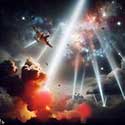
The skies over Britain in WW2 during air raids had to be seen to be believed. This page attempts to describe them, but it goes further by using personal recollections from people alive at the time to highlight the emotions felt by ordinary people watching from the ground.
____
By the webmaster based on personal recollections and contributions from others alive at the time
The searchlights
Sometimes when the houselights were off and I was supposed to be asleep, I would peep through the blackout curtains at the outside world. The searchlights flickered across the sky trying to seek out enemy bombers to shoot down. I just thought that the lights were pretty.
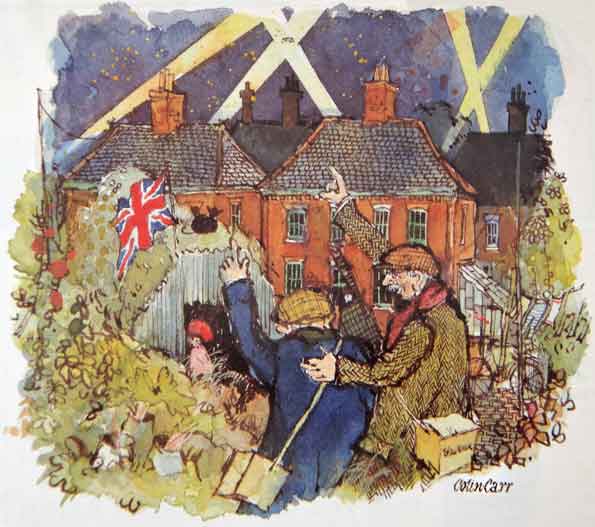
Searchlights during air-raids. A sketch from a magazine cutting from the effects of my mother. Note the Anderson shelter and the shoulder bags containing gas masks being carried by the people.
Yet years later when I saw laser lights as part of the Christmas decorations in London's Oxford Street, a shiver of recollection ran down my back. So perhaps I was more scared than I realised at the time, or maybe I had developed a better appreciation of the dreadfulness of war.
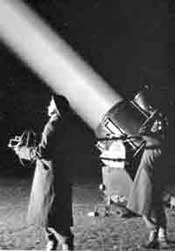
Ground staff operating a searchlight. Note the width of the beam and its intensity. Screen shot from an old film.
The meaning of 'Dogfight'
A feature of the skies in WW2 was what were called dogfights - another of those wartime terms that are probably unfamiliar to most people alive today. The following is a dictionary definition:
Dogfight: A close combat between military aircraft
I knew of them of course but, being so young, I was asleep when most dogfights took place. Fortunately what follows describes them well and comes from people older than me. First, though, some photographs of the planes involved.
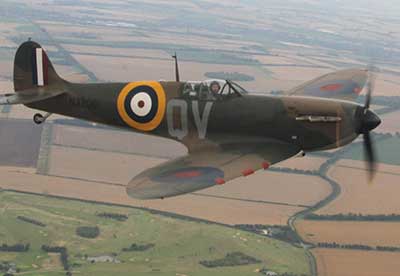
Spitfire Mark I courtesy of John Axtell who took the photograph from another plane flying alongside. This plane actually flew at Dunkirk in World War Two, but was shot down. It returned to the air, with lots of replacements in 2018.
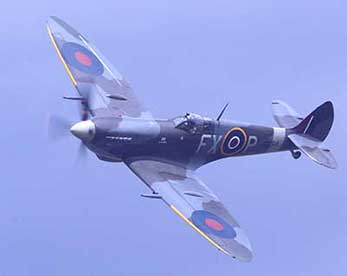
Spitfire Mark IX swooping in the sky just as the older versions would have done in the Battle of Britain, courtesy of John Axtell.
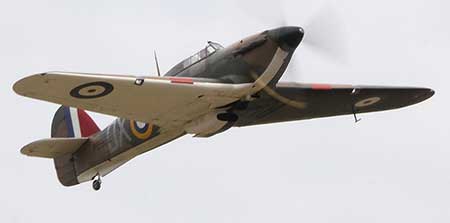
Hurricane-MkI, courtesy of John Axtell who took the photo at a Battle of Britain Air Display at Duxford.
This Hurricane was in action over the beaches of Dunkirk, but was hit so made a forced landing on the beach where it sank into the sands. It was excavated in the 1980s and more recently restored to flight.
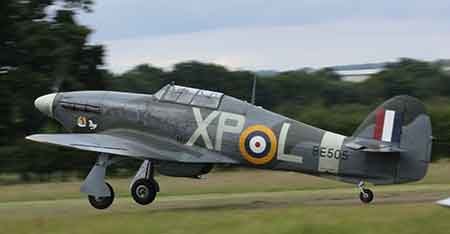
Hurricane at the point of taking off, courtesy of John Axtell who took the photo at a Battle of Britain Airshow at Headcorn in Kent, an RAF base in WWII. This Hurricane is a Mark II, so a newer variant than those in the Battle of Britain.
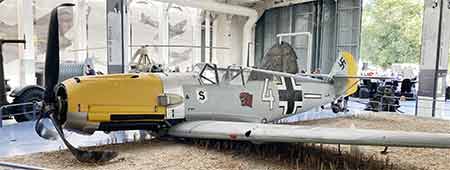
Messerschmitt Me109, Britain's enemy in the skies of World War Two, courtesy of John Axtell who took the photo from a display at Duxfore. Note the Nazi swastika, on the tail fin.
The rondel: the identification mark on military aircraft
contributed by John Axtell an aircraft enthusiast
The emblem on the wings and fuselage of military aircraft is called a rondel. The rondel on the fuselage of British aircraft is in the colours of the British flag, red white and blue, but is encircled in yellow to make it more visible and to further distinguish it from the French one, where the blue and red are reversed.
Recollections of dog fights in the Battle of Britain
contributed by Dick Hibberd, childhood recollections
Little did I appreciate the stress and strain of our Spitfire and Hurricane pilots in the sky above me, locked in deadly combat with their enemies.
It would only be when there was a momentary burst of gunfire from one of the planes that my schoolboy friends and I would leap from our bikes and run. Then we did appreciate something of the terrible danger these great RAF heroes were in. The occasional vapour trail left by a plane in the clear blue skies above our heads, the flash of sunlight from some part of one of the many planes, twisting and turning in and away from one another. It was like some macabre aerial ballet. Quite beautiful, but totally deadly.
contributed by Geoff Copus, personal recollections and reflections
Where my family lived in Orpington, Kent, we were on the flight path from Germany to London. Biggin Hill Aerodrome was also nearby. So we were very much affected by air raids. I remember being fascinated by the dogfights between the fighter planes in the skies above us. I knew no fear and no appreciation of what our pilots were doing for us. That came later as I grew up.
Explosions and fires light up the sky
contributed by Stan Clark, personal recollections
During an air raid, particularly the one on Coventry, the night sky glowed orange and red. Down below looked like a giant bubble bath from the shock waves from the bombs and shells exploding.
contributed by Doris Clarke, personal recollections
The barrage balloons were raised high during air raids to present obstacles for the German bombers. Being filled with hydrogen, which is highly flammable, they burst into flames mid-air when hit, which looked very strange, although of course beautiful. Today's firework displays were nothing on this!
contributed by John Cole, personal recollections
When a bomb went through the top of one of the gasometers in the gasworks along Angel Road, Edmonton, the flames shot several hundreds of feet up into the air. The pitch dark of the blackout was no longer, what with these flames, the searchlights and flashes, etc.
contributed by Tom Wallace, personal recollections
As I was born in 1937, I was still quite young during the worst of the air raids. Even so, I remember, one night my father holding me up to the windows during the blackout, and everywhere around, including the clouds, was a red glow where the bombs and aircraft had exploded.
contributed by John Cole, personal recollections
Sometimes my father would 'take me up' - i.e. out of our Anderson shelter - to see what was going on above us. We often used to stand behind the shelter's blast wall, watching all the planes, the 'tracer' bullets, searchlights in the sky and general hubbub. I think that the 'tracer' bullets got their name because they somehow glowed enabling our gunners to see the trajectories and thus trace and refine their aim.
German planes overhead on their way to bomb Coventry
contributed by Neil Cryer, personal recollections
My father took me out into the garden to see great numbers of German planes flying overhead. This was in Great Shelford, near Cambridge and there was speculation that the planes were on their way to bomb Coventry. There must have been hundreds of them, in formation of fours as I seem to remember.
The skies in the Battle of Britain
The Battle of Britain began on 10 July 1940 with a series of co-ordinated German air raids on shipping convoys in the Channel. RAF Fighter Command shot down 14 enemy aircraft and severely damaged 23 more at the start of a pivotal fight for aerial supremacy that lasted more than three months. The 3000 RAF fighter pilots held off the enemy, forcing Hitler to cancel the German invasion of the UK. This prompted Sir Winston Churchill's famous words, "Never in the field of human conflict has so much been owed by so many to so few".
contributed by John Cole, personal recollections
I vividly remember passing days in 1940 in my grandmother's back garden, in glorious weather, watching the aeroplanes above, weaving, turning and fighting each other in the sustained air campaign known as the Battle of Britain. Anyway, ours won - thank God!
| sources | webmaster | contact |
Text and images are copyright
If you can add anything to this page or provide a photo, please contact me.



